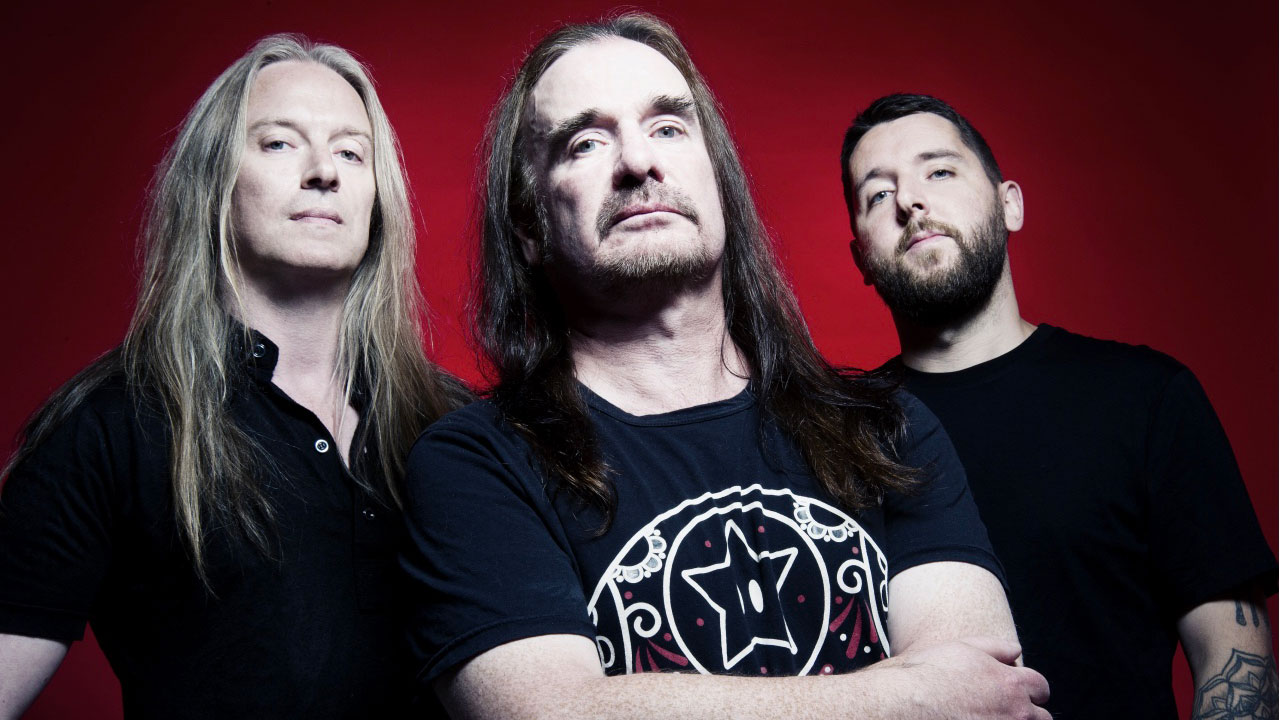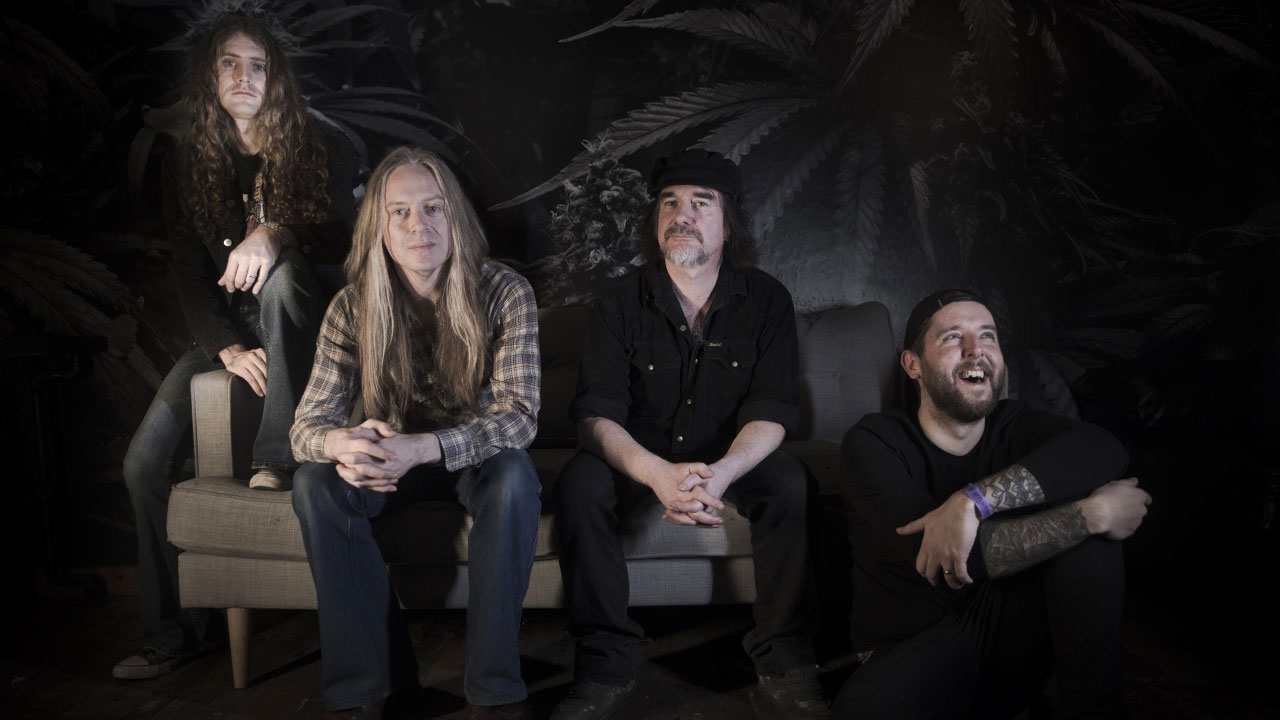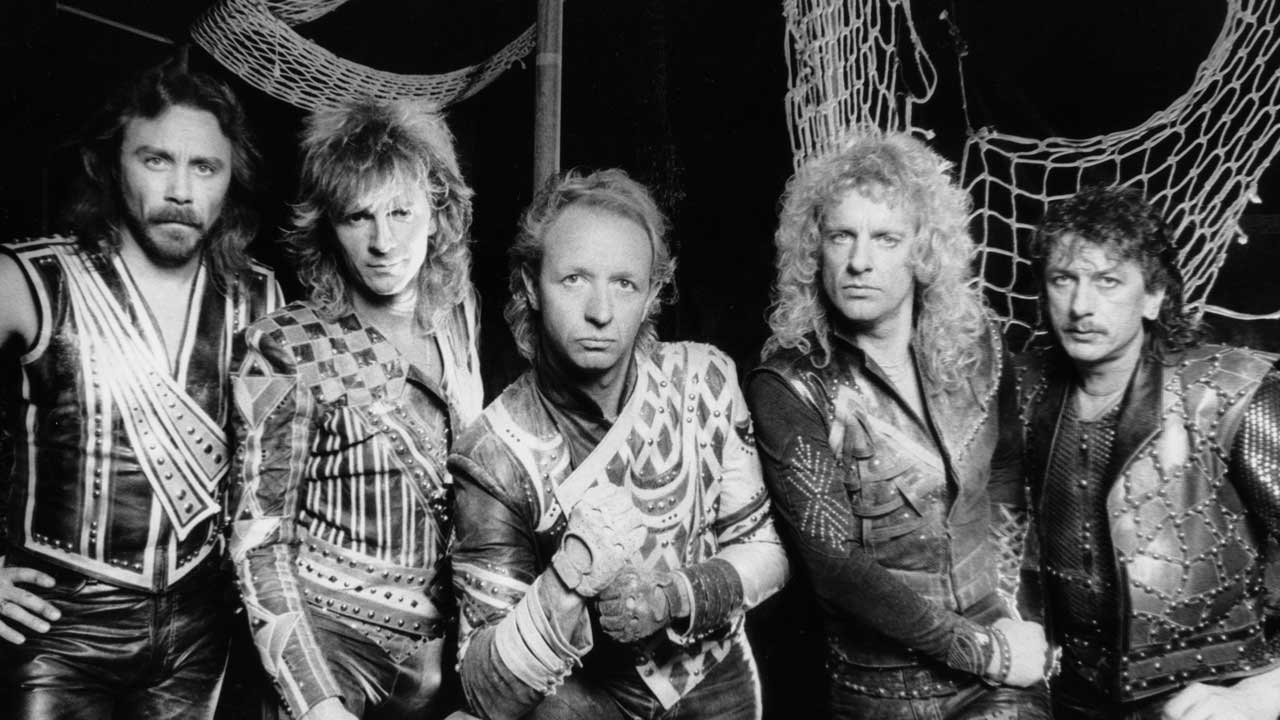Jeff Walker: "Tom Hanks used to play Carcass to his friends"
Carcass frontman Jeff Walker discusses being namechecked on Friends, played on Red Dwarf, why he's responsible for nu metal and his kinship with Lars Ulrich

Few people do dry irony like Jeff Walker. Carcass’s singer and bassist has just been recounting the tale of their 1996 album, Swansong, a record that could’ve fallen into a major label black hole if they hadn’t wriggled out of their deal. “It could still be gathering dust on a shelf,” he says. “Some people wish it was.”
This arched-eyebrow view of the world in general and the music business in particular has served him well since co-founding Carcass with guitarist Bill Steer and original drummer Ken Owen in 1986. The Merseyside band’s initial trajectory saw them transform from pathology-fixated grindcore malcontents to major label death metal powerhouse, before a sudden split in 1996 brought it all screeching to a halt. Yet absence makes the myocardium grow fonder, and a 2008 reunion saw Carcass greeted like returning heroes.
While the band’s post-comeback work-rate has been slower than before - upcoming album Torn Arteries is their second since reforming – Carcass’s status as one of the most influential bands of the last three decades is unassailable. “We’re just some death metal band,” says their never-knowingly-overstated frontman. “That’s all we ever wanted to be.”

What band made you want to do this?
“Probably the Sex Pistols. They were the first band I got into when I was nine or ten. They were brilliant. I didn’t think, ‘This is a punk band.’ They were just playing rock’n’roll.”
What was your first band?
“I joined a band called Bomb Culture around 1985. It was very 80s, very post- punk – synths and drum machines. Then I joined [crustpunks] Electro Hippies for a bit before I got kicked out.”
Sign up below to get the latest from Metal Hammer, plus exclusive special offers, direct to your inbox!
How did your parents react when you said you wanted to be a musician?
“There wasn’t a conversation. I get on great with my parents, but they knew fuck all about my bands until Carcass were on MTV in the 90s. Then suddenly they’re proud. But when you’re a long- haired layabout doing fuck all, they’re not so proud.”
The underground British punk and metal scene back then seemed to exist in its own universe. What was it like being part of that?
“It was just people who wanted to be in bands for the sake of it. Most people were realistic – if you wanted to be in a band, you were going to have to rough it. Nowadays, nobody wants to work for it – everybody wants to be on TikTok and make money. Nobody’s happy just going to concerts, everybody wants to be on the stage.”
According to Wikipedia, you were a hunt saboteur. Is that true?
“There was a time in my teenage years when I was involved in that stuff, but that was it. Don’t get me wrong, I’ve got no sympathy with hunts, but I’m a bit more laidback about these things now. You can’t spend your whole life being angry – you get burnt out. You realise out of frustration that you can’t win. Things do change and they will change, but they change gradually. It takes decades. I don’t think you get anywhere by ranting at people.”
You ended up joining Bill’s band, Disattack, which turned into Carcass.
“I used to see Bill at the local record store, Probe – this guy with long hair and a blue car coat. I met Ken at some hardcore gig. He always struck me as a bit fucking mad. Bill had a denim jacket with Venom and Slayer patches sewn neatly on the back. Ken had this cut-off battle jacket with the names of every band he liked scrawled on it in marker pen, like the wall of an asylum. That summed up their personalities.”
You’ve said you never wanted to be the singer in Carcass. What went wrong?
“We did a demo with our original singer, Sanjiv, but then we parted ways. We were on the way to record the first album [1988’s Reek Of Putrefaction] and we just decided to divvy up the vocals. In my head, Bill was always going to be the main singer, but then me and Ken carved it up with him. After that, one by one people dropped out. It was difficult for Ken to sing and play the drums, and having a singing drummer never looks good anyway. With Bill, he just lost enthusiasm. But Bill never seems to have enthusiasm for much.”
Reek Of Putrefaction is a grindcore classic, but you’ve been really dismissive of it. Why?
“It’s a sonic abortion. The production is shit. I’d like to re-record it, just to prove that it could be a really killer album, ’cos there’s some good riffs on it. With [1989’s] Symphonies Of Sickness, we were basically remaking that first album, ’cos it was such a disappointment. And by the time we made Necroticism [1991’s Necroticism – Descanting The Insalubrious] we were no longer seen as this crusty grind band, we were seen as a metal band. I remember our old manager saying, ‘Yeah, my favourite period was before you were this lame metal band.’ Maybe he was right.”

No other band had lyrics like Carcass: graphic descriptions of medical and pathological procedures. Was there a political subtext, or were you just trying to gross people out?
“We were pushing back against what was dumb in metal. There were other bands singing about gore and horrible things back then, but it was cartoonish. We wanted to show the reality and shock people. No, not shock them – disturb them. And we definitely wanted to get the album banned: [original label] Earache press up 1,000 copies, it gets banned, sells out and becomes a cult album. That’s all we wanted.”
How did that work out for you?
“It didn’t, did it? Nothing ever works out for us.”
Have you met any doctors or surgeons who were inspired by Carcass?
“Yeah, actually. Doctors, pathologists, vets, people who work in funeral parlours. We’re only talking a handful of people, but if it only inspires one person and makes them want to become a doctor, that’s fucking brilliant. It’s probably the most positive impact I’ve had on anyone in my life.”
It sounds weird now, but back then you were the poster band for vegetarianism in metal. Were you comfortable with that?
“I don’t think we were. We didn’t want to go on about it. When [US label] Combat were releasing Symphonies, they really wanted to make a big deal out of it. We thought it was stupid and pushed back against it, but we should have used it as an angle. Imagine how we feel now, seeing all these bands making a big fucking deal about it.”
You and Bill were in the TV sitcom Red Dwarf in 1989, playing members of the fictional band Smeg And The Heads. How did you end up doing that?
“[Red Dwarf star] Craig Charles got into Napalm Death for some reason, and he wanted them to go on Red Dwarf. But Shane [Embury] and Mick [Harris] from Napalm didn’t want to do it. So we were kind of the last resort.”
What do you remember about filming it?
“It was great. They pick you up in a taxi, drive you there, you get paid. I think we got 300 quid each, which is more than we earned at any of our gigs.”
The Red Dwarf appearance was weird, but not as weird as being name- checked by Phoebe in an episode of Friends years later…
“Somebody had tipped us off, so I was watching it at the time. And before the programme, the person who was introducing it over the old Channel 4 logo goes, ‘And now Phoebe fancies a bit of Carcass…’ or something. I was, like, ‘What the fuck is going on?’ I never found out why. I even emailed the producer from Friends years later to find out, but he was none the wiser. If they wanted a high-profile act, they wouldn’t have picked frigging Carcass.”
Was it tough going being a member of Carcass in the early days?
“Nah. We never had any grand ideas. We never thought we were the next Metallica. By the third album we managed to start scraping money together. But you’re just talking about replacing dole money with what little income you got from the band.”
Your fourth album, Heartwork, was the point where people really started to take notice. What was that like?
“Earache had licensed that album to Sony/Columbia in America, and it sold something like 70,000 copies in its first year. Nowadays a band would fucking kill to sell that many, but back then it meant fuck all. We failed on Sony. The first album we actually recorded for them was [1996’s] Swansong, and we managed to get ourselves dropped before it came out.”
What happened?
“We were out of contract with Earache, so we signed direct with Sony. We were on the front page of the Liverpool Echo, saying we were going to earn $7million from the deal – as if! But towards the end of the session, we could see that labels were starting to get cold feet about metal; big bands were getting dropped. We asked our A&R guy if we could get dropped. He knew the label wasn’t interested in us, so he negotiated it. They paid us to get out of our contract without releasing the album.”
How much did you walk away with?
“The advance for the first album was probably £100,000. We had some money left over from that to live on, and I think they gave us another £10,000 just to fuck off. And then Earache picked up the album and paid us more money to release it.”
Carcass split up before Swansong came out. What happened?
“Bill left. If he hadn’t, I probably would have. After the Sony thing, it was, ‘Where do we go now?’ Bill was getting into other stuff, and I was as well. We were starting to get sick of the sight of each other. The fun had dwindled. We just couldn’t see a future in doing it.”
Was there a big bust up?
“No. No heated fight or any of that bollocks. Just a quiet understanding that things had run their course.”
After the band split, you and Ken formed the more straightforward Blackstar. Did you think, ‘I’m Jeff Walker from Carcass, this is going to be massive right out of the gate’?
“No. I figured I had one more album in me [1997’s Barbed Wire Soul]. Blackstar was done purely for fun. It was out of step with what people wanted, but I was doing what I wanted. I wasn’t interested in playing 1,000mph at that point.”
In 1999, Ken had an aneurysm and almost died. It must have been difficult seeing him go through that.
“You underestimate what a cold-hearted bastard I am. Obviously it was upsetting seeing him at death’s door. But he’s a tough bastard and he pulled through. I mean, what do you expect me to say? Yeah, it was upsetting.”
Did you get any offers to join big- name metal bands during that period?
“I did get the odd phone call. Morbid Angel’s manager asked if I was interested in flying out to Florida ’cos David Vincent had left that band. I was, like, ‘No, you’re alright mate.’ Why would I want to go from Carcass to another band in that style?”
Carcass reunited in 2008. Unfinished business or just a big payday?
“I saw Emperor playing in LA and I texted Bill, saying: ‘I don’t mean to be rude, but we really should think about reforming Carcass.’ I’d been playing with Brujeria and promoters were asking me about Carcass. That’s where I was coming from: ‘Why am I being a hired gun when there’s a demand for my own band?’ Mike [Amott, former Carcass/current Arch Enemy guitarist] was hitting us up as well – I think people were bugging him about us as well. So me and him started bugging Bill about it. We were getting offers for money that we’d never seen in our lives. We didn’t realise how important the band had been to people.”
How would you describe your relationship with Bill?
“We both bring something out in each other that makes Carcass work. It’s a Hetfield-Ulrich situation. You can see the dynamic with those two guys – they don’t really love each other, but they’re co-dependent. Hetfield brings something to the table that Ulrich can’t, and the other way round. That’s like me and Bill.”
Which one of you is James and which one is Lars?
“Bill is Hetfield, ’cos of his rhythm playing, and I’m Ulrich because I’m more business-orientated and I’ve got more drive. And I’m an annoying twat.”
Who’s the most unlikely Carcass fan you’ve ever met?
“I remember years ago reading in a magazine that Tom Hanks used to have parties in Beverley Hills, and that he used to play Reek Of Putrefaction to his friends. Maybe some softarse got it wrong and they meant [reputed death metal fan] Jim Carrey. Or maybe my memory has just made it up.”
Carcass are part of the metal establishment these days. Do you ever wonder how the hell that happened?
“The narcissist in me assumes it was my destiny. But I think because we did something different, we obviously had an impact on people and on other bands. We don’t get credit for it, but hey, that’s just tough shit.”
Does that annoy you?
“It only narks you if someone else takes the credit. We downtuned to B and we kind of introduced that to the world of metal, as far as I’m concerned. There probably was somebody else who tuned to B, but I can’t think of anyone. It had some disastrous side effects, such as nu metal.”
Are you taking the credit for nu metal?
“In some respects, we kind of are responsible. They all worked with Ross Robinson, and he was a Carcass fan. A lot of those bands tuned to B. But they don’t know why they’re doing it half the time.”
Have you got any more Carcass albums in you, or are you happy to just coast towards retirement?
“I think this new album is coasting, don’t you?”
Taken from Metal Hammer #352. Torn Arteries is out now via Nuclear Blast
Dave Everley has been writing about and occasionally humming along to music since the early 90s. During that time, he has been Deputy Editor on Kerrang! and Classic Rock, Associate Editor on Q magazine and staff writer/tea boy on Raw, not necessarily in that order. He has written for Metal Hammer, Louder, Prog, the Observer, Select, Mojo, the Evening Standard and the totally legendary Ultrakill. He is still waiting for Billy Gibbons to send him a bottle of hot sauce he was promised several years ago.

